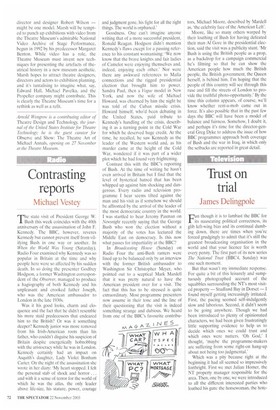Contrasting reports
Michael Vestey
The state visit of President George W. Bush this week coincides with the 40th anniversary of the assassination of John F. Kennedy. The BBC, however, reveres Kennedy but cannot prevent itself from vilifying Bush in one way or another. In When the World Was Young (Saturday), Radio Four examined why Kennedy was so popular in Britain at the time and why people here were so affected by his sudden death. In so doing the presenter Godfrey Hodgson, a former Washington correspondent of the Observer, managed to produce a hagiography of both Kennedy and his unpleasant and crooked father Joseph, who was the American ambassador to London in the late 1930s.
Was it his good looks, charm and eloquence and the fact that he didn't resemble his more staid predecessors that endeared him to the British? Or was it something deeper? Kennedy junior was more removed from his Irish-American roots than his father, who couldn't disguise his suspicion of Britain despite energetically hobnobbing with the aristocracy while he was in London. Kennedy certainly had an impact on Asquith's daughter, Lady Violet Bonham Carter. On the night of the assassination she wrote in her diary: 'My heart stopped. I felt the personal stab of shock and horror. .. . and with it a sense of terror for the world of which he was the atlas, the only leader above life-size, his stature, power, courage and judgment gone, his fight for all the right things. The world is orphaned.'
Goodness. One can't imagine anyone writing that of a more successful president, Ronald Reagan. Hodgson didn't mention Kennedy's flaws except for a passing reference to his constant womanising: 'We now know that the brave knights and fair ladies of Camelot were enjoying themselves and, indeed, enjoying each other.' Nor were there any awkward references to Mafia connections and the rigged presidential election that brought him to power. Sandra Paul, then a Vogue model in New York, and now the wife of Michael Howard, was charmed by him the night he was told of the Cuban missile crisis. Howard himself, who'd been debating in the United States, paid tribute to Kennedy's handling of the crisis, describing it as a turning point in the Cold War for which he deserved huge credit. At the time, he recalled, he saw Kennedy as the leader of the Western world and, as his murder came at the height of the Cold War, wondered if it was part of a wider plot which he had found very frightening.
Contrast this with the BBC's reporting of Bush. At the time of writing he hasn't even arrived in Britain but I find that the level of hysterical hatred that has been whipped up against him shocking and dangerous. Every radio and television programme I hear seems tilted against the man and his visit as if somehow we should be affronted by the arrival of the leader of the most democratic country in the world. I was startled to hear Jeremy Paxman on Newsnight recently saying that the George Bush who won the election without a majority of the votes has lectured the Middle East on democracy. Is this now what passes for impartiality at the BBC?
In Broadcasting House (Sunday) on Radio Four the anti-Bush ranters were lined up to be balanced only by an interview with the former British ambassador to Washington Sir Christopher Meyer, who pointed out to a sceptical Mark Mardell that it was pretty natural to have the American president over for a visit. The fact that this has to be stressed is quite extraordinary. Most programme presenters now assume in their tone and the line of their questioning that the visit is indeed something strange and dubious. We heard from one of the BBC's favourite contribu tors, Michael Moore, described by Mardell as, 'the celebrity face of the American Left'.
Moore, like so many others warped by their loathing of Bush for having defeated their man Al Gore in the presidential election, said the visit was a publicity stunt. 'Mr Bush is using the British people as a prop, as a backdrop for a campaign commercial he's filming so that he can show the American people how much the British people, the British government, the Queen herself, is behind him. I'm hoping that the people of this country will see through this ruse and fill the streets of London to provide the truthful photo-opportunity.' By the time this column appears, of course, we'll know whether rent-a-mob came out in force. It's also possible that in the past few days the BBC will have been a model of balance and fairness. Somehow, I doubt it, and perhaps it's time for the director-general Greg Dyke to address the issue of how BBC programmes approach both coverage of Bush and the war in Iraq, in which only the setbacks are reported in great detail.


























































































 Previous page
Previous page